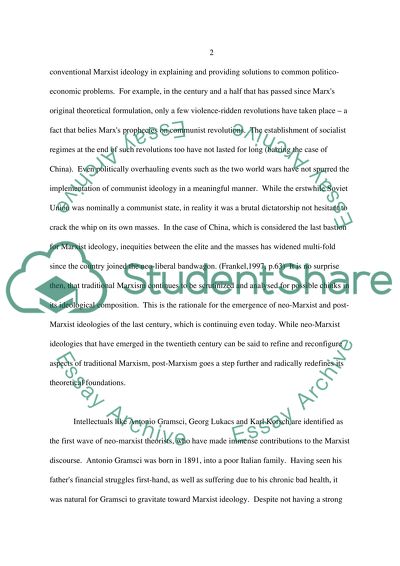Cite this document
(Marxist or Post-Marxist Theorists Assignment Example | Topics and Well Written Essays - 1750 words, n.d.)
Marxist or Post-Marxist Theorists Assignment Example | Topics and Well Written Essays - 1750 words. Retrieved from https://studentshare.org/politics/1574402-compare-and-contrast-the-positions-of-one-or-more-neo-marxist-or-post-marxist-theorists-of-ideology-with-those-of-the-classical-marxist-tradition
Marxist or Post-Marxist Theorists Assignment Example | Topics and Well Written Essays - 1750 words. Retrieved from https://studentshare.org/politics/1574402-compare-and-contrast-the-positions-of-one-or-more-neo-marxist-or-post-marxist-theorists-of-ideology-with-those-of-the-classical-marxist-tradition
(Marxist or Post-Marxist Theorists Assignment Example | Topics and Well Written Essays - 1750 Words)
Marxist or Post-Marxist Theorists Assignment Example | Topics and Well Written Essays - 1750 Words. https://studentshare.org/politics/1574402-compare-and-contrast-the-positions-of-one-or-more-neo-marxist-or-post-marxist-theorists-of-ideology-with-those-of-the-classical-marxist-tradition.
Marxist or Post-Marxist Theorists Assignment Example | Topics and Well Written Essays - 1750 Words. https://studentshare.org/politics/1574402-compare-and-contrast-the-positions-of-one-or-more-neo-marxist-or-post-marxist-theorists-of-ideology-with-those-of-the-classical-marxist-tradition.
“Marxist or Post-Marxist Theorists Assignment Example | Topics and Well Written Essays - 1750 Words”. https://studentshare.org/politics/1574402-compare-and-contrast-the-positions-of-one-or-more-neo-marxist-or-post-marxist-theorists-of-ideology-with-those-of-the-classical-marxist-tradition.


